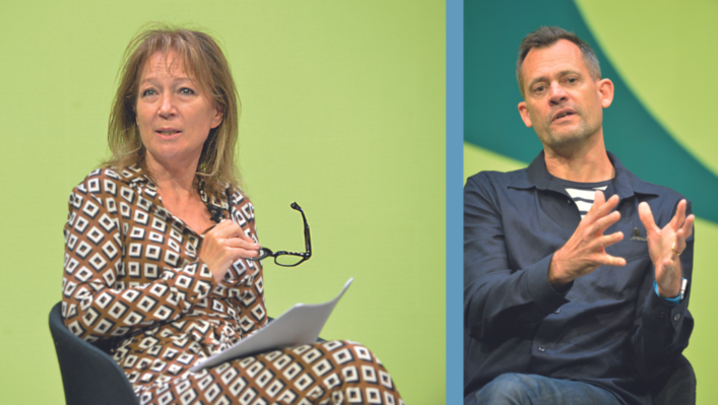Former Channel 4 CEO David Abraham reflects on a working life encompassing advertising and running TV networks on both sides of the Atlantic.
In one way, the career of David Abraham has come full circle. He began his working life in advertising – and, in his latest role, running his own company, Wonderhood Studios, he is once again involved in producing TV commercials, as well as making TV programmes. With his trademark heavy-rimmed glasses and carefully judged wardrobe, Abraham still looks like he might have stepped out of the pages of ad bible Campaign at its 1980s’ peak.
At the RTS London Christmas Lecture, he was guided back through his career by Broadcast editor Chris Curtis, who began the retrospective with the media executive’s role as joint-founder of the pioneering advertising company St Luke’s in the mid-1990s.
Judged by a Channel 4 Cutting Edge documentary about the agency – a clip was shown to the RTS – St Luke’s was very much ahead of its time. The company’s HQ – not unlike those of today’s tech giants, not least Google – was designed to somehow blur the edges between work and play.
There were bunk beds, a pool table and chairs straight out of a film celebrating the swinging sixties. Even “reading” The Sun’s page-three feature was apparently regarded as being part of the daily grind. St Luke’s offices bore more than a passing resemblance to a 1990s’ nightclub and the company was founded on certain fashionable principles, according to Abraham.
“We basically chucked every bit of management theory at it,” he said. “It brought out both the best in people and also the worst. It became really ungovernable once it got to about 200 people.” This willingness to take risks and to try and do things differently would become a hallmark of his career as he headed into the less freewheeling world of TV.
When Abraham joined Discovery in 2001, as general manager of Discovery Networks Europe, the company was still very much under the influence of its far-sighted, public-spirited founder, John Hendricks.
“It was a really special moment,” Abraham said. “John was a visionary, effectively taking the best of UK PSB content into the US. For me, it was a formative experience to join Discovery as 9/11 happened.…
“Everyone tried to respond to that event via the medium of documentary. TV was at the very centre of events. It was an extraordinary time to be in telly.”
Discovery was at the cutting edge of the brave new world of multichannel TV, as audiences could now access up to 30 channels, not just five.
As a non-programme-maker and as an outsider coming to TV from advertising, his critics called out Abraham for being a pseud. How did he react to this?
“I was always a great friend of TV,” he replied. “I’d had various interactions with the TV world at St Luke’s. There’s always been a brilliant cultural exchange between the two worlds of advertising and TV.… I’ve always been at the commercial end of creativity.”
His next job was running the Discovery-owned cable channel TLC in the US. He succeeded BBC executive Jana Bennett, so had a hard act to follow. “That was a scary moment,” admitted Abraham. “I was running a cable network with 90 million homes and I’d only been in telly for about three years.”
TLC needed a new hit. Fortunately, its new head found one in Miami Ink, set in a tattoo parlour, which survived six series and gave Abraham the kind of long-term success required by the voracious US TV market.
Returning to the UK in 2007, he faced another problem. Appointed CEO of multichannel provider UKTV (then owned by the BBC and Virgin), his task was to beef up the company’s profile and reboot its channels. The solution came with the marketing masterstroke of rebranding male-skewing G2 as – you guessed it – Dave.
Abraham was lucky in nailing the zeitgeist for lads’ TV, typified by shows such as Top Gear. Dave helped UKTV stand out from the crowd in what was becoming a very crowded sector.
“My experience in advertising gave me the confidence to make that call,” he noted, adding: “It was a complete one-off. The brilliant thing about Dave was that it was a cracking business success.” When Virgin sold its share of UKTV to US media company Scripps, Dave’s popularity enhanced the price that Virgin was able to ask.
Did it make sense for BBC Studios to eventually become UKTV’s sole owner? “I think there’s an industrial logic to that,” said Abraham.
Succeeding Andy Duncan as CEO of Channel 4, he tore up his predecessor’s policy of attempting to win a public subsidy for the station and set about driving the network forward into the fast-emerging world of digital data.
“Data is the new oil,” was David Abraham’s mantra. This strategy enabled Channel 4 to forge a new relationship with its audience and advertisers. In retrospect, this initiative was ahead of the curve and predated how the streamers and Sky got to know their subscribers’ tastes via their own crunching of digital data. Today, Channel 4 has 20 million registered viewers.
On the content front, Abraham won plaudits for Channel 4’s high-profile coverage of the 2012 London Paralympics and, eventually, filling the enormous gap in the schedules left by Big Brother’s demise.
“It was bloody scary, a bit like being on an aeroplane that loses an engine,” he recalled. “You’re looking at the overnights and wondering where that next hit is coming from.”
Despite the challenges, Abraham said he was fortunate to have had Lord Burns as Channel 4’s new chairman. And, ultimately, the new CEO believed that, provided the network performed well creatively, commercial success would follow.
His experience at TLC identifying shows with the potential to survive several seasons was vital, he said.
Working alongside his chief creative officer, Jay Hunt – now at Apple TV – Abraham successfully refreshed the broadcaster thanks to shows such as Gogglebox, Educating Yorkshire, Black Mirror and, later, The Great British Bake-Off.
Poaching Bake Off from the BBC caused controversy, especially since Channel 4’s remit was to innovate and to take risks. Abraham told the RTS that, at the time, the show was “leaving the BBC” and it was either going to go to ITV or Netflix.
“That would have hurt us [commercially],” he explained. “What we understood, rather brilliantly, was how to refresh the show. When you have a hit, it’s a real dilemma, [how] to keep it fresh.
“As a result of the changes that were made, audiences felt that they could fall back in love with the show for another few years.”
He added to audience laughter: “On every level, that was brilliantly executed – although I think Jay and I were the only people in the country who thought that for a few days.”
Which brings us to Abraham’s latest venture, the immodestly named Wonderhood Studios.
The company is breaking the mould by making high-quality commercials and TV content, and seeking to find synergies between both activities. The venture has got off to a promising start. An ad made by Wonderhood promoting Comic Relief, starring Peter Mullan as a granddad caring for his newborn grandson, was recently selected as one of Campaign’s top 10 ads of 2019. To produce a commercial with this level of emotional engagement is unusual.
Its message struck a chord, as the film suggested that, despite the divisions of Brexit, we all have much more in common – not least the capacity for giving to charity – than the things that separate us.
At the moment, Wonderhood is concentrating on factual shows. Its first documentary, in which Heston Blumenthal revealed some of his darkest thoughts, was shown on BBC Two in December. Provided the company continues to find investors, a move into drama looks possible.
For someone who likes to shake up existing models, Abraham’s ambition for his latest venture sounds refreshingly straightforward: “Whatever I’ve done, my ambition is to do great work.”
Abraham on…
… Fighting privatising of Channel 4
‘In the run-up to the Brexit referendum,’ recalled David Abraham, ‘there was a letter from John Whittingdale [at the time, culture secretary] to Tony Hall, Adam Crozier and myself, effectively like a headmaster’s letter, giving us a warning about the concept of due impartiality.’
‘The notion… was [that] one was obligated to give equal airtime to all points of view. In parallel with that, every weekend in the Sunday Times were stories along the lines of “We’re going to review the BBC licence fee”, “We’re going to privatise Channel 4”.
‘I’m not a conspiracy theorist, I’m just describing what was going on at that time.’
He added: ‘If you decide to privatise Channel 4, you cannot have the delivery of its entire remit. The unprofitable parts of the schedule, such as Channel 4 News and Dispatches, would disappear if Channel 4 was privately owned.
‘You have to re-educate people as to how the thing actually works.’
… On the future of the UK PSBs
‘They are, first and foremost, cultural institutions and remain massively influential… The business models that support the PSBs are more challenged than they’ve ever been.
‘I think that both the BBC and Channel 4 have the ability to keep producing and being known globally for extraordinary content, storytelling and journalism.
‘Look at the impact of Channel 4’s Cambridge Analytica investigation.…
‘I see a weakening of political will around the licence fee, and it potentially being an issue, which has to be guarded against. I’ve never bought the trope that says the BBC licence fee can’t survive.’
… Relocating C4 outside London
Did you spend so much time fighting privatisation that, when relocating Channel 4 became an issue, you were still stuck in battle mode?
‘It’s definitely something people have said. I’m not a historian. Other people will write that up,’ replied David Abraham. ‘Remember, we were in that weird period when we went into another general election [2017] where the Conservative manifesto said, “We will not privatise Channel 4 but we will forcibly relocate the entire organisation”…
‘No one had come to talk to me or the board about that.
‘After that election, we entered into a conversation about the art of the possible.
‘By then, I had decided that it was time to move on. I worked as diligently as I was able to in order to provide a toolbox of analysis that the team subsequently used to make the decisions they made after I left.’
He added: ‘The thing I was very vocal on was forcibly moving the whole of the organisation. I’m really pleased that didn’t happen. I think Channel 4 is quite a delicate thing.
‘The interaction between sales, marketing and content is carefully stitched together.… In the circumstances, I think that what has happened is a good outcome.’
… Protecting British creativity
‘The British creative culture is very distinct. American creative culture is brilliant, but American corporate culture can be problematic.’
… The survival of linear-TV
‘In 10 years’ time linear-TV will be distributed by IPTV, but scheduled TV will still be important; this more passive way of consuming curated content will have a very important role, not least in news and entertainment.’
Report by Steve Clarke. The RTS London Christmas Lecture with David Abraham was held at the Cavendish Conference Centre in London on 4 December. The producer was Terry Marsh.





